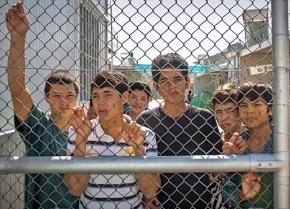The refugee “crisis” of a decaying system
In an article first published in the Australian newspaper Red Flag, argues that the world has only found homes for refugees when it’s good for capitalism.
AN OFFICIAL in Berlin refers to the refugees arriving in Germany as "the unwanted waste of the world". It is 1946, and he is a migration specialist from the occupying British army. He complains that Germany is not a "waste-paper basket with a limitless capacity" for this trash.
Seventy years later, there is talk of refugees "swamping" or "invading" Europe. One of the largest rallies ever in Warsaw last year chanted "Poland for the Polish!" There are frequent deadly attacks on refugee shelters in Germany; the far right are growing across Europe, mocking the slogan "never again" with their anti-Muslim filth.
However, this human tragedy illustrates a more fundamental problem than racism. It is the consequence of a decaying system mired in crisis.
Karl Marx said that capitalism developed dripping from head to foot with blood and filth, that it was a system of competition that would dominate the world, and that war was inevitable. The madness of the market would regularly send the system spiraling into crisis.

Since the global financial crisis of 2008, declining growth and increasing poverty alongside obscene wealth have become the new normal; 62 people now own the same wealth as the poorest 50 percent of the world's population.
In Europe there are 22 million officially unemployed. Governments across the continent, conscious of the growing resentment and discontent at wave after wave of austerity, respond with the age-old strategy: divide and rule.
Armed police turn peaceful protests into war zones and call them "riots". Muslims are vilified and persecuted. Refugees are confronted with increasingly fascistic laws which imply that they are to be feared.
This kind of suffering is inevitable while capitalism survives.
We've seen it before, on an even more massive scale. After World War II, many more millions than today were treated as pawns on a chessboard as the big powers jostled to divide Europe between them.
In July 1945, Churchill, Roosevelt and Stalin, meeting at Potsdam to divide up the spoils of war, agreed to "recognize that the transfer to Germany of German populations ... remaining in Poland, Czechoslovakia and Hungary, will have to be undertaken".
Poles were moved out of eastern areas of Poland that had been annexed by the USSR; thousands of others, especially Jews, became "displaced persons" as they searched for asylum.
R.M. Douglas, who has studied these events, concludes: "The Allies thus devoted themselves to the expulsion from their homes of between 12 and 14 million people: the largest single episode of ethnic cleansing in human history ... [A]t least 500,000 ... died as a result of hunger, disease, rapes, beatings or extrajudicial executions by soldiers and militia of the expelling countries".
Churchill had promised in 1944: "There will be no mixture of populations to cause endless trouble ... a clean sweep will be made". So the political figures who proclaimed about wonderful "European values" and democracy established the idea that different ethnic communities could not live together in peace.
MUCH OF Europe had been reduced to rubble. The massive rebuilding effort contributed to economic revival. That is the logic of the capitalist market. Destruction of lives, cities and resources enables capitalists to buy cheaply and get out of crisis.
Countries on the cusp of this new boom took in refugees--not for humanitarian reasons, but because they were potentially cheap labor. Australian Labor immigration minister Arthur Calwell's slogan was "populate or perish". Between 1947 and 1953, the Australian government assisted more than 170,000 displaced persons to migrate to Australia.
A government website tells us the arrival of 3 million migrants and refugees between 1945 and 1975 was "the key to quickly boosting Australia's population numbers in the interests of economic and military security".
Today, capitalists and governments have no solution to the crisis of neoliberalism. Their wars in the Middle East don't destroy assets at the core of the system, so rebuilding is not on the agenda. The millions fleeing to Europe are a fraction of those numbers. With a population of 500 million, Europe is prosperous compared to the 1940s and could easily offer them all a new life. Instead, billions are spent trying to keep people out.
Almost $9 billion will be spent sending refugees back from Greece to Turkey. Millions are spent on razor wire fencing and border patrols rather than dealing with the needs of the desperate--such as housing and projects that would provide employment.
The far right draw on a racist tradition articulated by politicians and literati since World War One. They tap into a growing audience wracked by uncertainty as they see jobs becoming more precarious and increasingly scarce.
As capitalism grinds into increasing decay and chaos for which the mass of people are expected to pay, the European Unions (EU) is abandoning the vision of a cultured, democratic Europe. Ageing capitalism is increasingly barbaric.
The crisis in the system no longer means refugees being pawns to be moved around for capitalists to exploit. It means exclusion, discrimination and being used as scapegoats for desperate people to blame instead of the real trash, those despicable criminals and parasites whose wars create refugees and consume the wealth that could be put to building a decent society.
First published at Red Flag.


